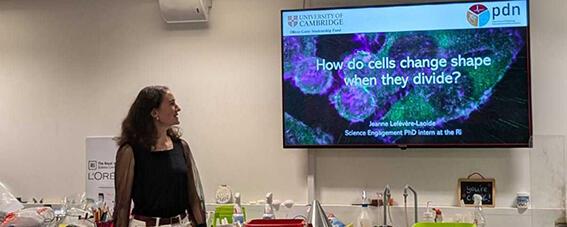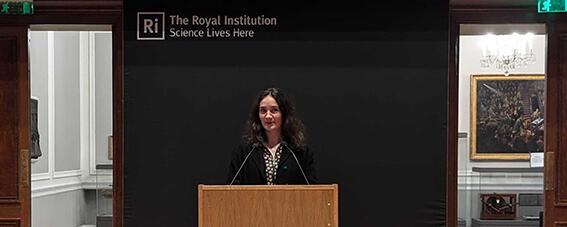When did you realise you wanted to pursue a PhD?
I have always been a naturally curious person, questioning how the world worked from a very young age. Since I enjoyed making things and being creative, I thought I would be a writer, an engineer, or an architect. I studied a mix of sciences at university, but it wasn’t until I did a research placement in the final year of my undergraduate degree that my supervisor, who had just finished her PhD, helped me realise that this was what I wanted to do. She told me about the creativity, teamwork, analysis, hands-on work, and critical thinking involved in a PhD in cell biology. I was sold - thank you, Stephanie!

Why do you think it is important to develop communication skills as a researcher?
Being able to communicate your science clearly and effectively is one of the most important parts of being a scientist. The whole purpose of scientific research is to advance and share knowledge, so it’s essential to know how to convey the novelty, excitement, and relevance of your work to specialist and non-specialist audiences alike.
I also think communication is a really fun aspect of doing a PhD, which can often feel a bit lonely or slow-moving, and I love learning about other people’s research! It’s very important to build a community of scientists which is embedded in society in lots of ways, including science communication, so that scientific progress and societal change can go hand-in-hand.
Whilst studying for your PhD, you decided to take a break to join the Ri for an internship. Can you tell us about this decision – why an internship and why the Ri?
Doing an internship was a requirement of my PhD, and while, at first, I thought it might keep me from making progress in my PhD, I eventually realised it would not only help me to regain some momentum and motivation for my PhD by giving me a break from lab work, but also allow me to develop some new skills and have a great time doing it!
In choosing an internship, I decided I wanted to do something that would help make sense of the research I was participating in and see its impact on society. I found an internship offer from the Ri and the more I read about it (especially other interns’ testimonials!), the more I was convinced that this was right up my alley! I loved the idea of working in science communication and being involved in engagement and outreach, to help bring scientific methods and concepts to as many people as possible. The Ri building and its location in central London didn’t hurt either!

What projects or programmes were you involved in at the Ri?
As a Science Engagement Intern, my time was shared between the Masterclasses, Science in Schools (SiS), and Christmas Lectures teams. I helped with a variety of projects ranging from data analysis for programme evaluations, to helping out at a couple of science and maths workshops, reviewing grant applications for SiS science shows, developing and formatting maths content for our off-the-shelf Masterclasses, recruiting speakers and doing research for the 2024 Youth Summit, briefing volunteers, going to schools to deliver trainings, and working with children on science problems. No two days were the same!
A lot of the work I did involved looking at demographics and deprivation data for our audiences – both for schools and children participating in Masterclasses and science shows, and event attendees. I really appreciated being involved in ensuring the Ri’s work reached the furthest it could, in line with its mission to make science accessible and available to all.
What were some highlights of your time here at the Ri?
I have been lucky enough to have lots of ‘wow’ moments during my time at the Ri, largely due to the huge amount of history contained in our building on Albemarle Street. One such moment was being taken on a tour of the Ri by the heritage team along with another intern and shown a few of the many very cool objects of the Ri. Among the objects, we got to hold a postcard sent to Lawrence Bragg signed by a dozen famous scientists, most of whom were also Nobel laureates – think Marie Curie and Albert Einstein –, an original copy of Robert Hooke’s Micrographia (a cell biologist’s dream!), a letter signed by Charles Darwin, and a real Nobel prize. Another time, I watched the heritage/demo team clean and tidy items from Michael Faraday’s original lab in our basement and helped move a 200-year-old electrostatic generator into storage!
In terms of my actual work, being on the organising team for the Youth Summit was a really great experience of seeing a project come to fruition. Amid the things I had never done before, meeting with the agent of a potential speaker to ask them to give a talk at the Youth Summit was exciting and a bit nerve-racking. On the day, the talk was amazing, and I had a student come up to me afterwards and ask when the speaker would be coming back to the Ri because they had loved the talk so much!
I also have lots of great memories of hanging out with the people who work here at the Ri and witnessing them doing their jobs. It’s been wonderful to work with so many amazing people who are all so good at what they do!
Any last words?
A huge thank you to everyone who’s mentored and supervised me (especially Sam Durbin who was my supervisor for the internship), helped me with projects, let me watch them work and ask lots of questions, and invited me along to pub outings! It’s been great and I will miss you all!
To anyone wondering whether an internship at the Ri is for you: if you’re interested in science communication and outreach, and/or you like heritage and history of science, and/or you get a thrill out of watching people build things and set them on fire, and/or you like working with children, … There are lots of opportunities to do lots of different things at the Ri, so I would say: go for it!
Discover Ri internships
We offer a variety of internship opportunities for PhD students throughout the year, ranging from working with young people in science workshops to taking part in the historical CHRISTMAS LECTURES (supported by CGI).